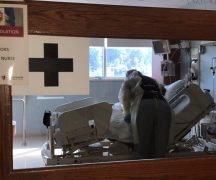By JAN LARSON McLAUGHLIN
BG Independent News
As of midnight, Ohioans are being ordered to stay home unless it is essential for them to venture out.
That raises many questions about what qualifies as essential.
On Sunday, Gov. Mike DeWine said the order allows exceptions, such as going to the grocery store, restaurant carryout, going to a park (but not use of playground equipment), taking care of neighbors or family members, or attending weddings and funerals.
“We haven’t faced an enemy like we are facing today in 102 years” since the Spanish flu, DeWine said. “We are at war. In the time of war, we have to make sacrifices.”
Those sacrifices are being sought from citizens and businesses – at least until April 6.
“The governor is asking us to use common sense,” said Wood County Sheriff Mark Wasylyshyn, who was on a conference call with the governor on Sunday.
It is expected that 99% of citizens will comply, Wasylyshyn said. The other 1% will comply once they are asked to do so by law enforcement and public health departments – which have been charged to enforce the stay-at-home order.
“It’s for their own good,” the sheriff said.
“The question is – what businesses are allowed to stay open? It’s very, very broad,” Wasylyshyn said. “There are so many entities that are directly or indirectly essential.”
Under DeWine’s new stay-at-home order, essential businesses include health care and public health operations, human services operations, essential government functions and the following:
- Law enforcement, public safety, first responders.
- Energy, including electricians, petroleum workers, etc.
- Water and wastewater.
- Public works.
- Critical manufacturing.
- Hazardous materials.
- Defense industrial base.
- Stores that sell groceries and medicine.
- Restaurants for consumption off-premises.
- Food, beverage, and licensed marijuana production and agriculture.
- Organizations that provide charitable and social services.
- Transportation, such as airlines, taxis, ride-share apps, and public transportation.
- Hotel and motels.
- Religious entities.
- Funeral services.
- Media, including newspapers, radio and TV stations.
- Gas stations, auto-repair and transportation businesses.
- Financial and insurance institutions.
- Hardware and supply stores.
- Critical trades such as plumbers, electricians, cleaning and janitorial staff, and security staff.
- Mail, post, shipping, delivery and pickup services.
- Laundry services.
- Home-based care.
- Residential facilities and shelters.
Also Sunday, DeWine announced that childcare centers will have to obtain temporary pandemic licenses and limit attendance to six children per room. That order goes into effect Thursday through April 30.
But the lines are blurred about which businesses are actually essential. DeWine wants to see businesses make decisions based on public safety, according to Wood County Health Commissioner Ben Batey.
“He needs a good faith effort from businesses,” Batey said on Sunday.
“We need folks to use common sense. Are we truly an essential service or not?” Batey said businesses should be asking.
Businesses that continue operating will be asked to reduce the staff exposed to each other, make sure employees work at least six feet apart, limit customers, and promote disinfecting surfaces and handwashing.
“We will respond to complaints” at businesses, Batey said.
In Wood County, several businesses are closing and governmental offices are working with skeleton staffing.
“We’re seeing businesses shut down,” Batey said.
As for Ohio citizens, it is unlikely that they will be questioned about their travels outside the home.
“I don’t see people being pulled over by law enforcement and questioned if they need to be out and about,” Batey said.
Wasylyshyn agreed.
“We’re not going to be stopping cars to find out why people are out,” he said.
Bowling Green Police Division will be discussing how to enforce the governor’s order.
After DeWine’s stay-at-home announcement, Bowling Green grocery stores saw an increase in local residents stocking up on food and essential items, according to Bowling Green Police Lt. Dan Mancuso.
“I think the majority of people and businesses are doing their best to limit exposure,” Mancuso said.
Citizens need to start asking if they truly need to venture out, Batey said. Stop at one store rather than several, and don’t take the kids, he suggested.
“We need to see streets become quiet to some extent,” he said.
By doing that, public health officials hope to make sure hospital services are available for those who need them the most.





